Make it easier to hear and be heard
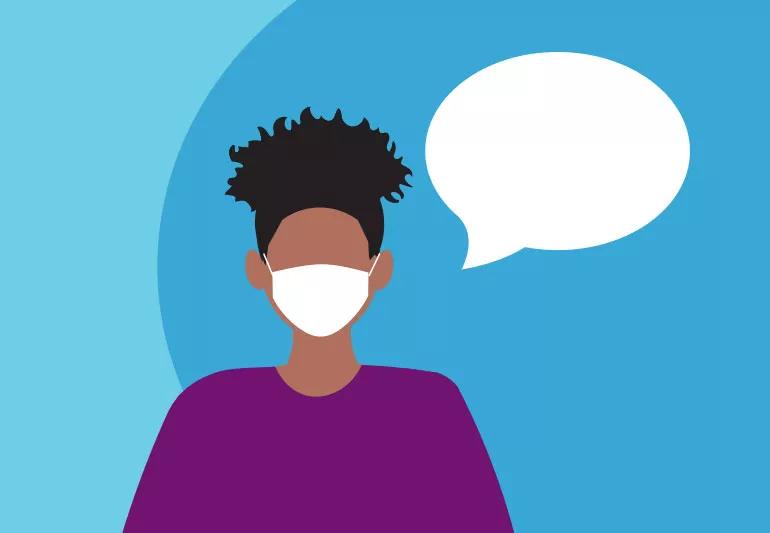
Before the pandemic, it was hard to hear mumblers or low talkers. Add face masks to the equation and what do you get? A whole lot of huhs and what did you says.
Cleveland Clinic is a non-profit academic medical center. Advertising on our site helps support our mission. We do not endorse non-Cleveland Clinic products or services. Policy
If communicating through a mask has been quite a challenge for you, imagine what it’s been like for people who have some form of hearing loss. While masks have been a major barrier, there are a few things you can do to ensure that you can hear and be heard during masked conversations.
Sarah Sydlowski, AuD, PhD, MBA, and audiology director of Cleveland Clinic’s Hearing Implant Program has some surefire ways to help you get your messages across clearly regardless of the circumstances.
It’s been estimated that approximately 15% of American adults (37.5 million) age 18 and over have reported some trouble hearing. While older age often equates to more hearing loss, hearing loss can occur at any stage of life. So, as you’re having those day-to-day conversations, don’t assume that everyone can hear you, especially when you’re talking through a mask.
“There are two things about masks. One is that they essentially muffle your voice volume-wise and they cause a reduction in high pitch sounds, like consonants that start and end words and give them their meaning. This actually mimics one of the most common types of hearing loss and gives everyone these days the experience of what it’s like to live with hearing loss. So all of us are feeling a little frustrated,” says Dr. Sydlowski.
The second thing about masks — people with hearing loss have an additional barrier to overcome.
“People who have hearing loss are getting hit doubly because masks are making communication challenges even greater than they normally are,” says Dr. Sydlowski.
When we’re around people who have trouble hearing, we often default to talking louder, yelling and repeating the same thing over and over. These actions often lead to frustration on both sides and don’t actually improve the likelihood of successful communication.
Dr. Sydlowski explains.
“When somebody doesn’t hear us, our natural tendency is just to say the same thing again, maybe louder. Sometimes, it’s actually better to clarify by rephrasing what you said. For the listener who is struggling, instead of just saying ‘What?’ help the speaker understand which part you missed. This way they can clarify the part that was missed more effectively — which is very helpful.”
Dr. Sydlowski says louder is not usually better with a mask, but you do want to raise the volume of your voice just a little bit to get past the barrier. She adds that it’s actually more helpful to speak very slowly and clearly, and to really enunciate the beginnings and ends of words since we all know that masks muffle everything.
If you have a person in your circle who is hard of hearing but can read lips, Dr. Sydlowski recommends wearing a clear mask.
“If you know you’re going to be talking with people who do have a form of hearing loss, you might want to consider getting a mask that has a transparent window. You can find masks with clear panels that allow people to see your face and read your lips to supplement their hearing,” she says.
There are a few clear masks on the market that have been FDA-approved. Or, if you’re up for the challenge, it’s possible to make one. However, the one thing to watch for with a clear mask is fogging. The good news is, there are options available that won’t fog up or they can be treated with a moisture repellant.
Whatever you do, wearing a face shield without a mask isn’t a good idea. Research suggests face shields are not as effective as masks, particularly at blocking outgoing particles. Dr. Sydlowski stresses that hearing loss is not a reason not to wear a mask. If you have trouble hearing, she suggests wearing a button or other notification to let others know so they can adjust their speech during conversations.
When you’re communicating with someone who has difficulty hearing, Dr. Sydlowski suggests looking in their direction and not looking away, “We’ve lost a lot of visual information with masks because we can’t see each other’s lips. Looking at someone while you’re talking lets them know that you really have their attention — which is extra important.”
While there are many low-tech things you can do to improve communication while wearing a mask, Dr. Sydlowski says there are a number of high-tech options for the hearing impaired that can help as well.
“There are a lot of good like speech to text apps like Google Live Transcribe that you can have on your cellphone. As you’re talking, it will caption your conversation so you have a reference to make sure that you’re understanding what you hear. You can also use the “Live Listen” feature on an iPhone with compatible hearing aids or AirPods to bring conversations closer while still being physically distant. A lot of hearing aids or cochlear hearing devices these days even have a little device called a remote microphone. You can put it closer to the person you want to hear and it will stream their voice directly into the hearing device.”
Struggling to hear people or other sounds outside of the mask is a good indicator that you should have your hearing checked.
Dr. Sydlowski explains.
“Hearing is one of those things that you don’t notice is changing. If you’re already at the point where you’re starting to think it is different, it most likely has changed a lot — and you won’t know what you’re missing because you’re not hearing it. People often express embarrassment when they’re told that they need hearing aids. But a lot of times, I’ll say, ‘What’s more embarrassing? Using a device to help you hear better or missing out on conversations and not being able to respond to them appropriately?’ “
While hearing devices have historically had a stigma associated with them, Dr. Sydlowski says people have started to recognize how important it is to have the ability to stay connected to those around them. They also understand hearing devices can help them stay sharp mentally.
“Some studies have shown that when hearing loss isn’t treated appropriately, there may be a relationship to cognitive decline. Doing something about your hearing early is such an easy way to stay connected and stay sharp so you can keep doing what you love.”
Dr. Sydlowski believes that a major part of clear communication is just being aware of how we talk and adjusting accordingly. “Honestly, a huge part of it is just recognizing there is a challenge that’s happening, it’s real, it’s affecting all of us and that we all need to be a little more cognizant of just slowing down and speaking clearly, especially when extra distance is involved.”
Learn more about our editorial process.
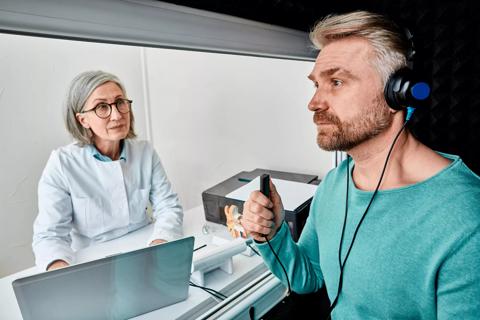
COVID-19 may be associated with tinnitus, but research is still ongoing

The short answer: It’s complicated, but the basic care precautions still prevail, like washing your hands and isolating if you’re sick
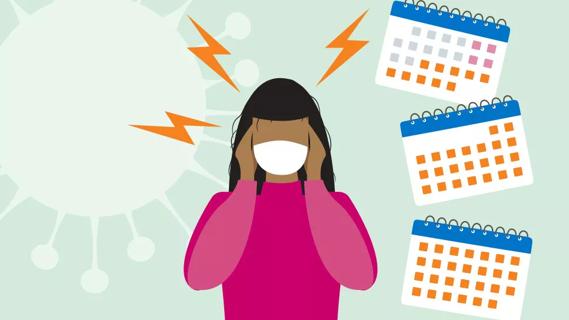
They can feel like a typical headache or a migraine headache, but the pain can last for weeks to months
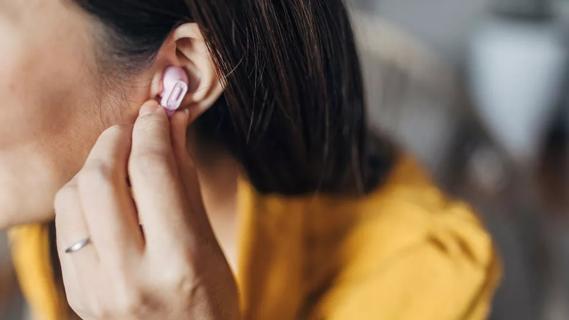
Care for your ears by steering clear of cotton swabs, taking precautions in loud settings and seeking medical help when needed
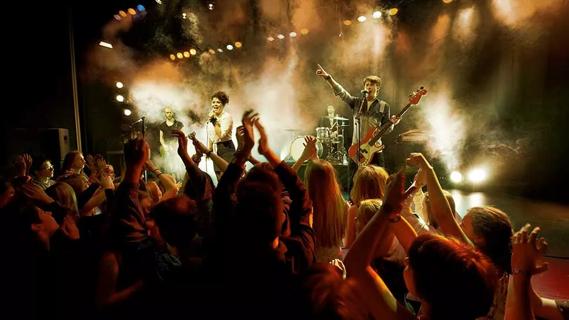
Any large social gathering — from a family birthday party to an indoor music concert — has the potential to spread serious infection

It’s important to connect with a healthcare provider, get quality sleep and balance your activities with your energy levels

Symptoms can overlap and be hard to distinguish, but there are some telltale differences

Just like the flu, COVID-19 will continue to evolve every year

Your metabolism may torch 1,300 to 2,000 calories daily with no activity

A gentle touch in all the right places may help drain your sinuses